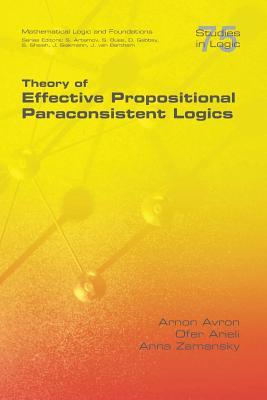Perhaps the most counterintuitive property of classical logic (as well as of its most famous rival, intuitionistic logic) is the fact that it allows the inference of any proposition from a single pair of contradicting statements. A lot of work and efforts have been devoted over the years to develop alternatives to classical logic that do not have this drawback. Those alternatives are nowadays called paraconsistent systems', and the corresponding research area --- paraconsistent reasoning.
The purpose of this book is to provide a comprehensive methodological presentation of the rich mathematical theory that exists by now concerning the most
fundamental part of paraconsistent reasoning: propositional (monotonic) logics. Among those logics it mainly concentrates on those which are effective
(in the sense that they are decidable, have a concrete semantics, and can be equipped with implementable analytic proof systems).
The first part of the book defines in precise terms all the basic notions that are related to paraconsistency, after reviewing all the necessary preliminaries. The other parts describe in detail all of the main approaches to the subject. This includes finite-valued semantics (both truth functional and non-deterministic);
logics of formal inconsistency; relevant logics; constructive paraconsistent logics which are based on positive intuitionistic logic; and paraconsistent logics which are based on modal logics. The book covers thousands of paraconsistent logics, each of which is studied both from a semantical and from a proof
theoretical points of view. In addition, most of those logics are characterized in terms of minimality or maximality properties that they may have.

Theory of Effective Propositional Paraconsistent Logics
Perhaps the most counterintuitive property of classical logic (as well as of its most famous rival, intuitionistic logic) is the fact that it allows the inference of any proposition from a single pair of contradicting statements. A lot of work and efforts have been devoted over the years to develop alternatives to classical logic that do not have this drawback. Those alternatives are nowadays called paraconsistent systems', and the corresponding research area --- paraconsistent reasoning.
The purpose of this book is to provide a comprehensive methodological presentation of the rich mathematical theory that exists by now concerning the most
fundamental part of paraconsistent reasoning: propositional (monotonic) logics. Among those logics it mainly concentrates on those which are effective
(in the sense that they are decidable, have a concrete semantics, and can be equipped with implementable analytic proof systems).
The first part of the book defines in precise terms all the basic notions that are related to paraconsistency, after reviewing all the necessary preliminaries. The other parts describe in detail all of the main approaches to the subject. This includes finite-valued semantics (both truth functional and non-deterministic);
logics of formal inconsistency; relevant logics; constructive paraconsistent logics which are based on positive intuitionistic logic; and paraconsistent logics which are based on modal logics. The book covers thousands of paraconsistent logics, each of which is studied both from a semantical and from a proof
theoretical points of view. In addition, most of those logics are characterized in terms of minimality or maximality properties that they may have.